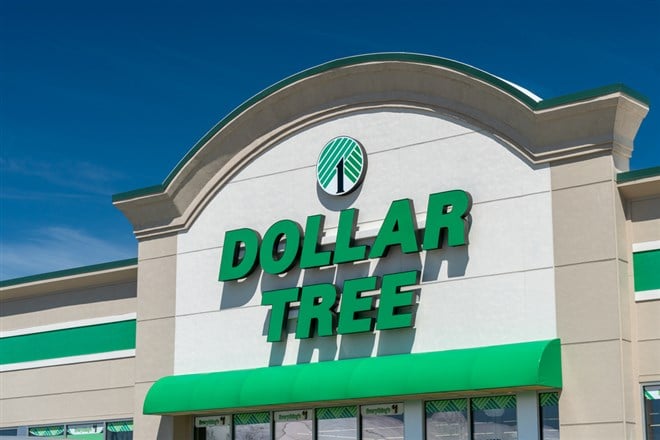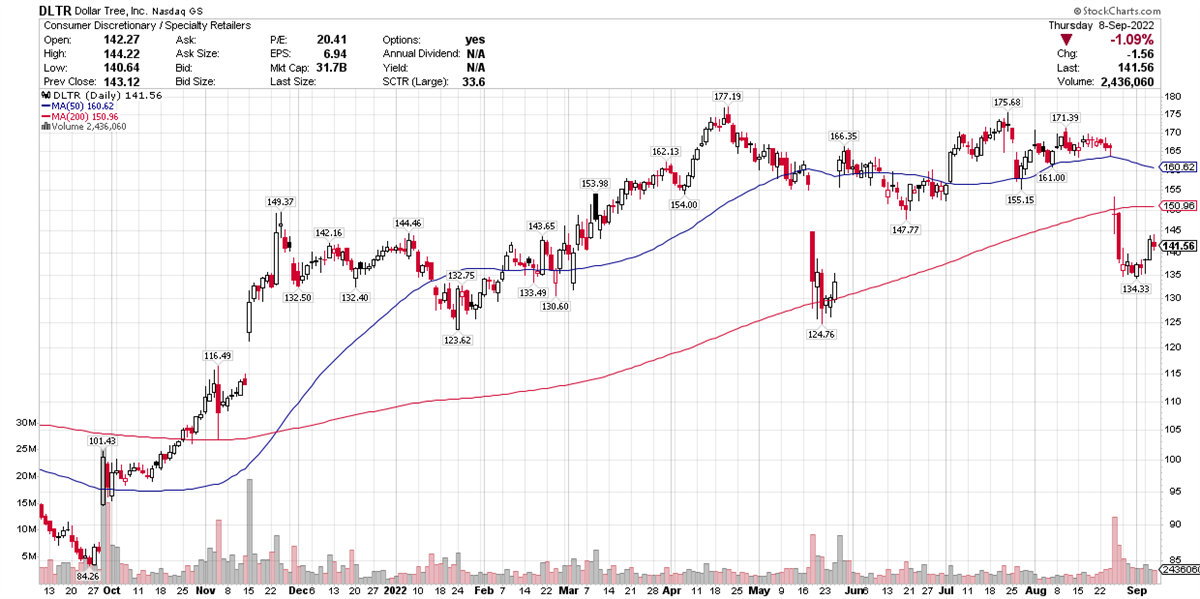 You would think discount stores would flourish in an era of high inflation and recession fears, but Dollar Tree (NASDAQ: DLTR) gapped down hard following its quarterly earnings report. Even so, the stock is outperforming the market, and its industry has been rallying.
You would think discount stores would flourish in an era of high inflation and recession fears, but Dollar Tree (NASDAQ: DLTR) gapped down hard following its quarterly earnings report. Even so, the stock is outperforming the market, and its industry has been rallying. Dollar Tree sales grew 7% year-over-year, to $6.765 billion. Earnings came in at $1.60 per share, up 30% from a year ago. MarketBeat earnings data show the company has topped analysts’ bottom-line views in each of the past 11 quarters.
However, sales were below analysts’ expectations of $6.80 billion. That disappointment resulted in a gap-down of 10.22% on August 25. Shares have not yet recovered, and remain well below their all-time high of $177.19, reached on April 21.
Shares closed Thursday at $141.56, down $1.56, or 1.09%.
Annual revenue has grown in each of the past three years.Still Facing Challenges
In the earnings conference call, executive chairman Rick Dreiling outlined some of the challenges facing both retailers and consumers.
”Inflation is at its highest in decades as shoppers are experiencing higher costs related to food, fuel, rent and more,” he said. “Supply chains have been strained and inconsistent. Inventory levels are higher across retail, and consumer shopping patterns continue to zig and zag.”
The Virginia-based company operates the Dollar Tree and Family Dollar chains. In the second quarter, consumables represented 77.3% of Family Dollar sales. Consumables are products used on a daily basis, with food and personal hygiene and cleaning products being prime examples.
The company has “modestly increased expectations for Family Dollar” in the second half of the year, said CEO Mike Witynski in the earnings call.
Nonetheless, he noted that the company is making changes to begin offering better pricing that over time, will boost sales and profitability. But in the short term, that will erode gross margins in the second half of the year. That warning, more than a revenue miss, is what sent shares plummeting.
Supply-chain issues appear to be clearing up. “[F]rom a sourcing perspective, a year ago, we had a backlog of thousands of containers we were working to get through the transpacific shipping lanes. This year, we have a small, manageable backlog,” said Witynski.
Year-to-date, Dollar Tree has advanced by 1.85%. The stock has shown some big price swings, including a 12.72% gain in March, as well as double-digit-percentage gaps down and then back up again in May.
With a market capitalization of $31.70 billion, putting it in large-cap territory, Dollar Tree is tracked by the S&P 500. It has a weighting of just 0.09551% of the total composition, meaning its movements really won’t have any effect on the broader index.Outpacing Broader Market
However, Dollar Tree, like many other stocks, tends to move more or less in tandem with the broader market. That means it’s been tracking up-and-down movements, although Dollar Tree is performing better than the wider index, which is down 16.75% year-to-date.
According to MarketBeat analyst data, the Wall Street consensus rating on the stock is a “moderate buy,” with a price target of $163.47, a potential upside of 15.48%. Immediately after the second-quarter report, six analysts lowered their price target on Dollar Tree.
For the full year, analysts expect earnings of $7.28 per share, up 26% from 2021. For next year, that’s seen rising another 14%, to $8.29 per share. Both those estimates have been revised lower lately, which makes sense, given the recent decreases in analysts’ price targets.
Dollar Tree is also tracked within the S&P large-cap consumer discretionary sector, where it’s the component with the lowest weighting. The sector is down 22.60% year-to-date, so the stock is outperforming even its sector.
Within the more specific discount retail industry, Dollar Tree is among the leaders, along with B.J.’s Wholesale Club (NYSE: BJ), Dollar General (NYSE: DG), Ollie’s Bargain Outlet (NASDAQ: OLLI), and Grocery Outlet (NASDAQ: GO).
The industry as a whole has been rallying in the past six months. 




